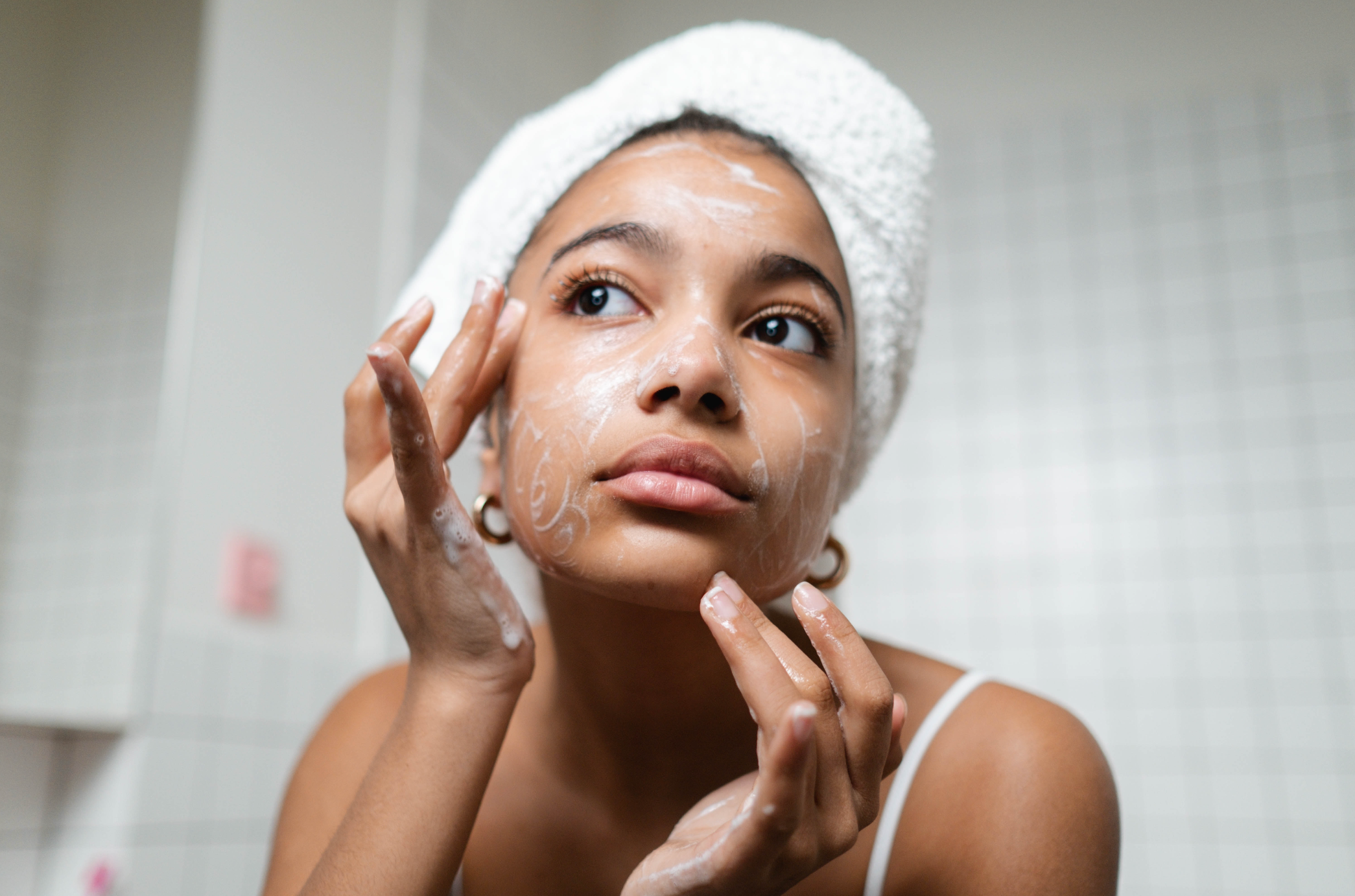From blackheads and the occasional blemish to unsightly acne, breakouts are never fun. And sadly, these skin concerns are not confined to puberty, as adult acne is an increasingly common complaint. No matter what your age or skin type, women are also more likely to suffer from acne, a broad term that includes pimples, blackheads, whiteheads, and more severe cystic bumps. While there are a slew of causes behind breakouts, including hormonal changes, genetics, lifestyle factors like diet and stress, and even skincare products, essentially, pimples are the result of a combination of sebum and bacteria.
So what is the best way to achieve clearer, healthier skin and banish breakouts for good? To find out, we turned to clean beauty experts Trish Alkaitis, organic skin care educator and CEO of Dr. Alkaitis Organics, and nutritionist and founder of the eponymous skincare line, Kat Burki. Read on to find out what causes breakouts of all kinds, the best ingredients to prevent and treat acne-prone skin, and how to create a customized skincare routine.
What Is Acne?
According to The National Institutes of Health, acne is an inflammatory disorder of the skin that occurs when hair follicles become plugged with oil and dead skin cells. In healthy skin, the sebaceous glands make sebum that empties onto the skin surface through the pore, which is an opening in the follicle. Acne is the result of hair, sebum, and keratinocytes sticking together inside the pore, preventing the keratinocytes from shedding and the sebum from reaching the surface of the skin. “Primarily, acne is a combination of trapped bacteria and an unbalanced microbiome that is ill equipped to maintain it,” Burki concludes.
What Causes Acne?
The underlying causes of acne are multiple and include both hormonal fluctuations and genetics (in other words you may be more likely to get acne if your parents had acne). “Acne relates to hormones in one way or another,” Burki explains. “When your growth hormones start to slow down, women who might have never experienced acne in their teens (when estrogen and progesterone kick into high gear) can suddenly experience acne for the first time. Genetics also play a role in how your body adapts to hormonal changes.”
While these factors might be beyond your control, there are other triggers, says Alkaitis, that you can identify and eliminate. “I have found that most external causes of a breakout are the result of skin, hair, and makeup products and sunscreen, and even laundry detergents and toothpastes that contain toxic ingredients, preservatives, and fragrances. Other causes include picking at your skin and friction on the skin,” she says (think the straps on your bike helmet or face masks that lead to maskne).
Another factor to consider is lifestyle, things like a poor diet, stress, and a lack of healthy habits can also exacerbate breakouts. “I have seen so much success through diet and lifestyle changes,” says Alkaitis, who recommends avoiding dairy, refined carbohydrates, sugar, and alcohol, and eating more cruciferous vegetables like broccoli, brussels sprouts, cauliflower, cabbage, and kale. “These are known to stimulate detoxifying enzymes in the digestive system and regulate your hormonal balance,” she says. “Take a good quality omega-3 fatty acid; Vitamins A, C, D, and E; plus zinc and selenium and drink organic burdock and green tea. It’s all about creating a lifestyle that you can manage to support your health. I would also recommend monthly facials, lymphatic massage, and yoga to calm the nervous system.”
How To Care For Acne Prone Skin
When an untimely, ugly pimple pops up out of nowhere, the temptation to pick and squeeze, or reach for harsh, chemical treatments to dry up and clear your skin, are the top two don'ts according to both Alkaitis and Burki. “The worst mistake made is picking your pimples,” says Alkaitis. Picking at blemishes will not only increase inflammation, leading to a longer-lasting pimple, with more chance of scarring and hyperpigmentation, but will also introduce more bacteria into the skin, which could lead to infection.
In addition, Alkaitis says, “I would avoid all products that are too active. Using a product that will overly dry out your pimples pushes the skin into an unbalanced state that triggers a signal to your body to produce more oil and then things can quickly escalate from there. I have also seen a lot of people try to ‘scrub’ or ‘over exfoliate’ their acne away. Unfortunately, this is just going to wreak havoc on an already upset skin condition.”
Burki adds, “Overuse of retinol is a common mistake, as well as using alcohol-based products and quick fixes to heal a breakout. Both cause excessive inflammation, to which the skin responds poorly.” Instead, she says, reach for products with antibacterial and anti-inflammatory properties. “Believe it or not, many oils are great anti-bacterials,” she says. “Raspberry Seed Oil is highly rich in natural Salicylic Acid. Kaolin Clay-based masks are great at drying up oils clogged in the top layers of the skin and more stubborn cystic acne. Also remember to feed the skin with all the antioxidants you can.”
While it is important to exfoliate to prevent clogged pores and stimulate cell turnover, when dealing with acne, Alkaitis says to only use a gentle exfoliator that is not too active. “Witch Hazel (another natural source of Salicylic Acid) and fruit enzymes are less abrasive, yet combat bacteria beautifully.” And always follow up with nourishing ingredients to repair the skin. “Raspberry Seed and Sea Buckthorn oils are great at replenishing stripped oils while repairing the biome.”
What Are the Best Products for Blemish- and Acne-Prone Skin?
Ultimately, sticking to a regular skincare routine that addresses the root causes of acne, such as excess oil production, clogged pores, and an unhealthy skin microbiome, is the most effective approach to managing and preventing acne breakouts. “Simple changes can go a long way,” says Burki. “Establishing a good skincare routine that includes regular exfoliation can be just the reset your skin needs.”
